
*Note: I apologize for the late post this month as I was in Chongqing and Chengdu in Sichuan, China during the first week of 2020 (currently recovering from all the spicy food!!! 🌶️🌶️🌶️)*
Dear Valued Reader, Happy New Year and Happy New Decade! 🎉🎉🎉
I sincerely hope that you had a great holiday, however you may have chosen to spend it.
The turning of a new decade is an excellent (and perhaps even auspicious) time to reflect on our life, our journey, and what lies ahead for each of us.
By the way, I'll also release my first ever annual report later this month to reflect on my first calendar year of operations (my site launched back in November 2018).
Stay tuned as I'll share lots of useful info in that report (such as P&L and Amazon sales data) along with some helpful tips for beginners to online marketing.
“I've started to truly appreciate the value of flexibility: not just being able to go where you most want, but also to where you're most needed.”
Last month, I began to truly understand the value of flexibility.
During the first week of December, my mother called me and said that my grandma was in critical condition in the hospital in Nanjing (the city where I was born).
For context, my grandma is 94 and has been bedridden for over 8 years.
Upon hearing this, I cancelled my travel plans in Thailand and booked a flight to Nanjing right away. I was able to see my grandma before she, unfortunately, passed away at the hospital.
In the following days, I experienced my first funeral (for a family member) and attended an intense and emotional burial ceremony for my grandparents in a small village near Fengcheng, Jiangxi.
Throughout this whole process, I felt immensely grateful that I was able to be there in my family's time of need (without any constraints like taking time off work).
I've started to truly appreciate the value of flexibility: not just being able to go where you most want (personal freedom), but also to where you're most needed (honoring my family).
Next, I'd like to present the key metrics for December 2019.
In December, revenue and traffic recovered from previous declines in October and November (which I attributed in last month's post to Google's September 2019 Core Algorithm Update).
Overall, I believe the recovery in December was due to two main factors:
As a side note, I plan to slightly revise my key metrics in the new year. I'll be replacing the unit of measure for traffic (currently unique pageviews) with a different metric (sessions).
After taking the Google Analytics for Beginners course, I realized that sessions is a better way to measure user traffic for my business. In short, I care about conversions (affiliate link clicks) for each individual session, not for each unique pageview.
As a reminder, I chose these 3 key metrics for their simplicity and elegance in representing overall business performance (revenue = $, traffic = units, RPM = revenue per thousand or profitability).
In November 2019's post, I outlined a plan to:
To that end, I made good progress on all three fronts: completely upgrading a content subcategory, adding high authority guest post links (DR 50+ but UR 10-20), and including a physical address and phone number on my site along with business citations and branded anchor texts.
In terms of results, here's what I saw during the month of December:
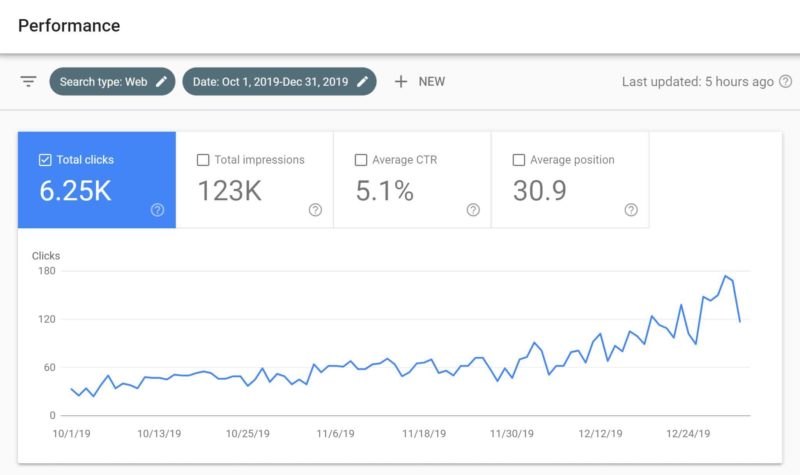
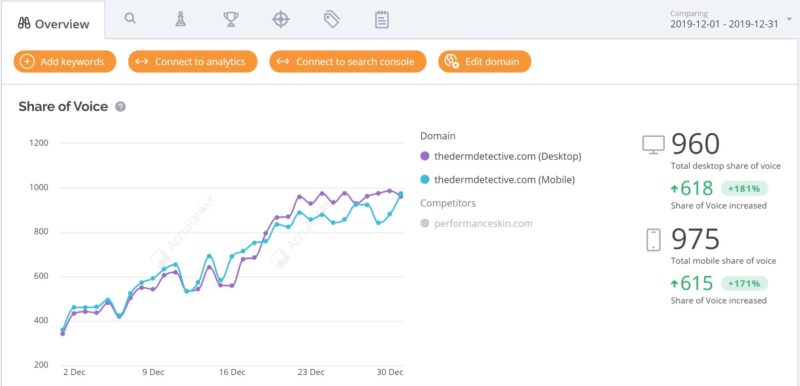
“I've found that agency links are, at this stage in the game, a cost-efficient (and so far, effective) way to add high quality backlinks.”
In November, I ordered two guest post links from SEOButler after meeting their team and CEO at the Chiang Mai SEO Conference 2019.
I considered Authority Builders and DFY Links as well (both were also at this conference) but found that SEOButler offered better value in their inventory for my particular niche.
Both guest posts were published around the end of November on relevant and high authority sites (DR 50+ but UR 10-20 as these were brand new articles).
Overall, I was quite pleased with the placement site quality (they were genuine sites, not exactly the cream of the crop, but definitely not PBNs or low quality sites).
After about 2 weeks, I started to notice significant ranking and traffic improvements as shown in the Accuranker and Google Search Console data.
As I mentioned in November's "Food 4 Thought", my site currently generates enough cash flow to fund 1-2 agency links a month. By reinvesting in high authority links, I can effectively compound my own site's authority without additional cash investment into the business.
However, I do recognize that there are disadvantages and risks with agency links (particularly with long-term sustainability as it's a greyhat tactic), which is why it remains a link diversification strategy, not a replacement for internal link building.
All things considered, I've found that agency links are, at this stage in the game, a cost-efficient (and so far, effective) way to add high quality backlinks.
I'll expand further on this topic in my upcoming annual report as this change in philosophy, from "whitehat" shotgun skyscraper outreach, has seriously saved me so much time and resources, which I've since redeployed into content, on-page optimization, and conversion rate optimization.
As I grow my site further, I'll eventually turn my full attention to designing an effective link building process (and I have a few ideas that do not involve low quality "shotgun" outreach).
“I strongly believe that content quality made a difference as similar content, which had not been upgraded, did not improve in rank to the same extent.”
Last month, I also "doubled down" on content quality by updating existing articles to meet my current research standards and design formats.
This process included:
In total, I upgraded 11 "review" posts and updated or created another 12 "vs" posts.
In terms of results, these upgrades helped boost most of my reviews to the top 3 positions. Almost all of my "vs" posts now rank #1 or #2 and are often the featured snippet.
Here's an example of a post that was stuck on the bottom of page 1 for several months.
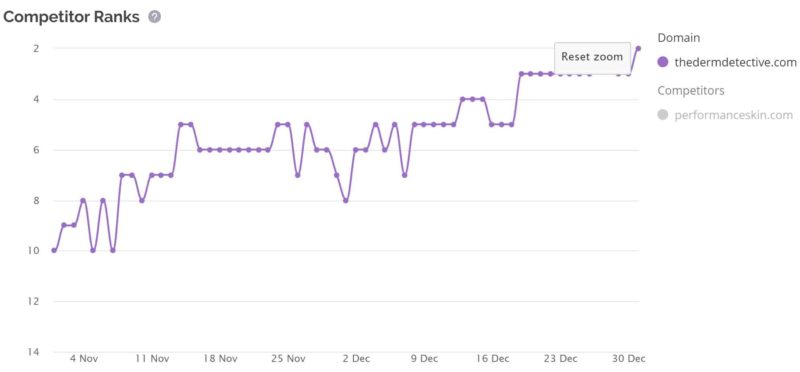
After upgrading the article in early November, it slowly made its way to the top of page 1 and now ranks just below Amazon.com.
Here's another example.
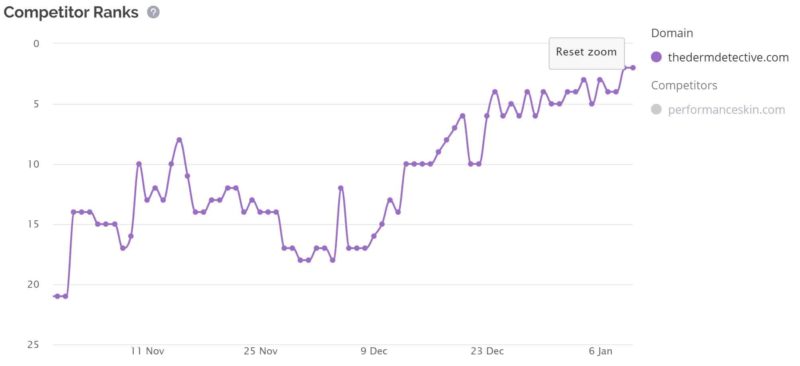
This post struggled for months on page 2 until I upgraded it in mid-November. Subsequently, it jumped onto page 1 in December and then into the top 5 in January.
To be clear, I am not 100% certain that these content upgrades were the sole factor in boosting my rankings since this time period overlaps with recent agency link acquisitions.
However, I strongly believe that content quality made a difference as similar content, which had not been upgraded, did not improve in rank to the same extent.
In any case, I intend to continue upgrading the rest of my existing content in a similar fashion and focus on getting those articles to rank in the top 3 positions (if not #1).
I've also started to work on some conversion rate optimization (CRO) initiatives. The basic idea here is to increase conversions through better user experience and strategic design principles.
Here are some of the items I've implemented so far:
Here's an example of an AAWP comparison table on my site.
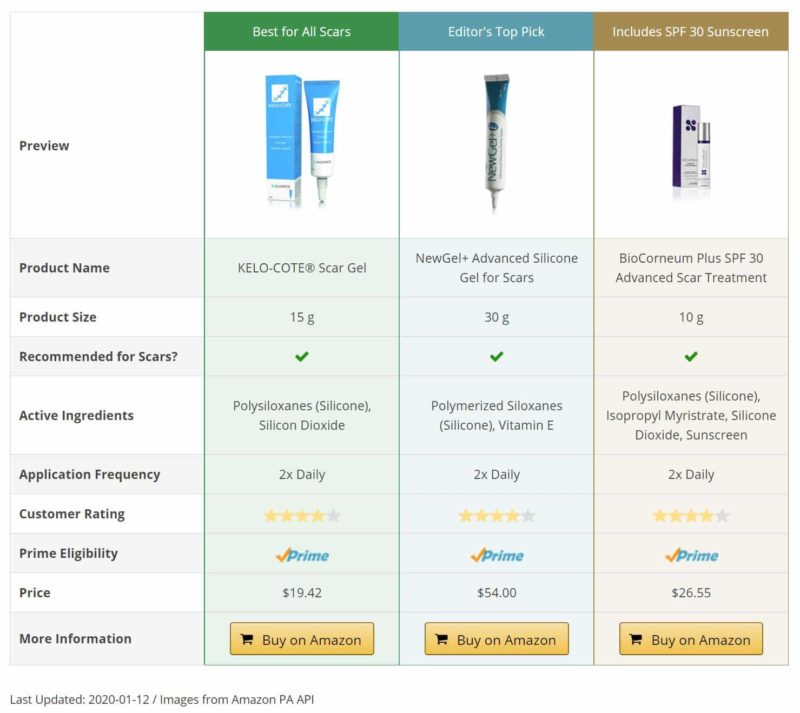
In order to measure the impact of these CRO initiatives, I need to obtain accurate data on conversions (affiliate link clicks) and traffic (I've decided to use sessions instead of unique pageviews).
Next, I'll discuss how I've setup data collection using Google Analytics and Google Tag Manager.
“...one of my key priorities is to develop a data-rich environment for decision-making and decision-assessment.”
First of all, I must admit that I've neglected data collection and data analysis during my first year as I was preoccupied with creating content and building backlinks.
But as I outlined in my 6-month plan, one of my key priorities is to develop a data-rich environment for decision-making and decision-assessment.
In other words, having the right data (and enough of it) to evaluate whether something is working.
Now, I'll walk through how I'm collecting this data. In short, I want to know two key metrics: conversions and traffic, which we can then use to calculate the conversion rate.
I also want to know some details about each conversion such as the page URL, link URL (i.e. which Amazon link did they click on?), device type (mobile, desktop, or tablet?), and so forth.
This is very important data that will help me understand where users are converting on my site (and where they're not converting so I can improve the user experience).
First, let's start with traffic as it's the easier metric to obtain.
By default, when you install the Google Analytics tracking code, you'll find different metrics for traffic in the reporting dashboard (like pageviews, unique pageviews, sessions, and users).
However, one thing that I did not do early on is configure my Google Analytics account properly to ensure high quality data collection. For instance, by adding basic filters like excluding traffic from known bots and excluding traffic from internal IP addresses.
In other words, my "unfiltered" or raw data actually included junk traffic from robots (like Googlebot which periodically crawls my site) as well as my own clicks on my site.
Unfortunately, given the way filters in Google Analytics work, I can't just "filter out" this junk traffic on previously collected data. It can only be applied to future data.
The last thing I did in Google Analytics is enable the "Demographics and Interests Report" to collect additional data about my audience such as age, gender, and interest groups.
This data will help me better understand my audience and create specific user profiles.
Moving on to Google Tag Manager. This is essentially a tool that helps webmasters deploy code universally across their site without requiring hours of manual updates.
For my purposes, I'm only using GTM to track user clicks and scroll depth.
Funny enough, I was previously collecting this data but decided it wasn't useful at the time and axed the GTM code because it added another HTTP request.
Anyhow, now I'm able to collect detailed info about each conversion on my site and, combined with clean traffic data, measure the conversion rate of each page.
I intend to use this data to evaluate CRO initiatives and fix underperforming pages.
I'm very excited to bring this data-driven approach into 2020 and beyond!
“It ain't what you don't know that gets you into trouble. It's what you know for sure that just ain't so.”
In the 18 months since I've embarked on my passive income journey, I've read about, listened to, learned from, and even met, a lot of people who do SEO for a living.
But I've realized (more so in recent months) that the SEO community is, more often than not, a case of "the blind leading the blind."
To quote Shakespeare (because why not?):
"... it is a tale / Told by an idiot, full of sound and fury, / Signifying nothing." (Macbeth Scene V)
In other words, most SEO advice on the Internet is not based on any scientific evidence. It's often the end result of speculation, groupthink, and religious belief.
An interesting example comes to mind: the Christian (or insert another religion) says to the atheist, "Prove to me that God doesn't exist."
(Bear with me as I do have a point to make in all of this.)
I'm starting to see so many similarities between SEO and my previous career in finance.
For example, a critical skill in finance (and life in general) is knowing when someone is trying to "pull the wool over your eyes", or as we might colloquially say, is full of sh*t.
I used to watch a lot of business TV (like CNBC) and you'd hear people say things like:
Now, I see this same type of emotional language used everyday in SEO land:
Now, you might think that this type of language is inconsequential, merely used to "spice up" the dish in which something intelligent is, presumably, the main course.
But I strongly believe that the words we choose to use are absolutely essential to how we think, how we know something, and how we then express that knowledge to others.
Those who actually know SEO don't use this type of language. Instead, they say things like:
They do not say things like:
The difference, however, between financial markets and search engine markets is that the former can be irrational (driven by human emotions, fear and greed) while the latter cannot be irrational (driven by mathematical principles and algorithms).
In other words, you can reasonably say that something is unknowable in finance (as the future is uncertain and market prices will always fluctuate) but you cannot reasonably say that SEO is unknowable (only that it is very complicated as none of us work inside Google's search team).
And now, for my actual point (yes, this was all a preramble).
In this new decade, I plan to focus my efforts on acquiring "deep knowledge".
Deep knowledge is an intimate understanding of what a thing is and how a thing works.
Because it is so difficult and time-consuming to obtain, most people do not bother and settle instead for 80/20 knowledge (which is why going the extra mile can be a source of competitive advantage).
So far, most of what I've learned about SEO can be described as a patchwork of generally accepted (but not necessarily true) opinions, gossip, tips & tricks, blog posts, some field observations, and personal intuition.
It's a messy concoction of all the things I've seen, heard, felt, and experienced, while being led by the "blind" and bumping into all sorts of SEO pundits, courses, and a daily barrage of SEO news.
How, then, do I plan to change my approach?
First, I will remove the short-term noise and low quality sources of information (email newsletters, daily SEO updates, the infinite number of Facebook comments...).
Second, I will, like Socrates, start with the assumption that I know nothing (just like Jon Snow). Then, slowly build up my library of knowledge based on actual SEO tests.
Originally, I was going to create a test site this year and publish those results here on this blog. However, a new community called Internet Marketing Gold (IMG) recently surfaced that offers a more time-efficient way to obtain verified SEO knowledge.
IMG offers both free and paid memberships that include access to the top 15 and 100 ranking factors, respectively. The paid membership also includes all of their actual SEO tests.
I intend to explore this community more in the upcoming months. I may consider the paid plan as a time-efficient way to develop my base of verified SEO knowledge.
However, I do still plan to create a test site at some point in the future.
Third (and finally), I will increase my understanding of search engines through introspection.
It may sound crazy, but I believe that there's a lot that one can understand about Google simply through a few thought experiments, such as:
Critical thinking through introspection and understanding Google's long-term vision is a necessary supplement to scientific SEO tests. The latter tells you what works today, while the former helps you predict what is likely to work both tomorrow and beyond.
For example, if SEO tests tell you that comment spam works spectatularly well in 2005, should you just do that and call it a day? Those who did so were wiped out by algorithm updates in the subsequent decade as Google grew in computational power and complexity (yes, it got smarter!).
The second idea that I'm thinking about is how to build a long-term competitive advantage (LTCA).
Or as Warren Buffett calls it, digging a "moat" around your business.
I find that in online marketing (or perhaps SEO in particular), people are very secretive about their web properties for fear of additional competition (and perhaps reasonably so).
I mean, why invite more competition with yourself?
But the mere fact that others do not know what "niche" you're in cannot be a LTCA.
Consider the following:
While I understand the desire for secrecy (online marketers are a competitive lot), I'm of the opinion that intense competition will always breed the highest quality in the end.
Eventually, someone (with both adequate knowledge and resources) will stumble across your "niche" and compete with you. Secrecy is a weak shield against competition.
What, then, are some possible LTCAs? Here are a few that's on my mind:
1. Proprietary Data
While access to massive amounts of data has never been easier in online marketing (think Ahrefs), I believe that proprietary data will likely remain a source of LTCA.
For example, if you're already ranking well in your niche, then you have access to:
Where I think this data becomes really valuable is when external estimates (like Ahrefs) are way off the mark compared to the actual data.
This might mean that potential competitors will pass over keywords, products, and even entire niches, simply because they don't have enough data to make a decision.
This is particularly true of low volume keywords where keyword research tools like Ahrefs are just making wild guesses.
To help illustrate my point, here is Neil Patel's smiling face on Ubersuggest showing 20 searches per month for a particular keyword:

Now, here's the actual impressions data from Google Search Console:

Frankly, we could extend this line of thinking to affiliate programs and products as well. That is, because you already know which programs and products are the most profitable for your site.
One major disadvantage, however, is that a potential competitor can easily scrape your entire site and copy your keywords and affiliate products. In fact, this is a common approach for beginners - just go out and mimic your competitors.
In conclusion, I think there is value in proprietary data that could be a LTCA, but because it can be copied so easily, I am hesitant to rely upon it to build my "moat".
2. Content Quality
In addition to data quality, perhaps content quality can form the basis of our LTCA. That is, having a deep level of expertise that is very difficult to replicate for a new entrant.
In health, this is typically the "I'm a medical doctor so trust me" route (although I'd garner a guess that most health articles are not written by actual doctors).
For my own site, this would be "I've had a lot of personal experience with scars so trust me".
But there's more to content quality than simply expertise. The actual content itself must also be valuable and difficult to replicate.
A few examples:
3. Resources
Next, it's worth considering if simply having more (or better) resources is a LTCA.
Perhaps I can win by just outspending my competitors on writers, editors, outreach teams, links, designers, PR firms, and what have you (not that I can, by the way).
However, I don't think that having more resources is really a LTCA. Rather, it means that you're able to play at a higher stakes poker table (which might be more lucrative).
But building an internal team of specialists (or renting them) does expedite the site building process, both in terms of time and quality. Therefore, I consider the team aspect as a critical part of creating a sustainable long-term advantage.
In the end, resources matter. But no rational person would invest their money without demanding a fair return on their investment. You (or your competitor) could just outspend each other, but there's a limit on that spending, and it's called ROI.
4. Insider Relationships
By insider relationships, what I mean is having access to better commission rates and payment structures with merchants and affiliate networks (so probably not Amazon).
I first heard about this idea on a podcast (can't remember which one now). They mentioned that by having a better affiliate offer than your competitors, you can outbid them on things like Google and Facebook ads as you have more margin to work with.
In addition, you might also obtain insider data on sales performance, conversion rates, marketing materials, and perhaps even customized landing pages.
In conclusion: I think it's imperative to define what your competitive advantage is (or how you intend to develop it over time) so that you're continuously building up your moat against future competitors.
This is something that I will continue to think about and try to narrow down.
My final idea this month is to start thinking outside the taco (see what I did there?).
What exactly do I mean?
Well, when you think about how most people are building their affiliate sites, they tend to take the most direct approach to both traffic and monetization.
Their content strategy is often separated into:
The basic idea here is to capture users near the end of the sales funnel (where they are more likely to convert into paying customers at Amazon) with our affiliate content. Meanwhile, our info content helps us build backlinks (however, we don't necessarily care if any users actually visit those articles).
Now, while this model does work (and quite successfully for many people), the issue that comes up very quickly is that if everyone is following this template, then the competition for the exact same affiliate keywords is going to skyrocket in every niche.
In other words, every "Tom, Dick, and Stanley" is going after the same "review", "vs", and "best" keywords that you're currently eyeing in Ahrefs.
Also, trying to rank for an ultra competitive keyword like "best credit card" is next to impossible given how many webpages (with far more resources than you) are optimized to win this query.
Next, a second drawback is that by focusing only on the bottom of the funnel, you're limiting yourself to the lowest traffic keywords. The implied bet you're taking here is that, despite the lower search volume, users at the bottom have much stronger purchase intent and are therefore more likely to convert, which then compensates for the lower volume.
Finally, a third point that I'll make here is that every piece of content on your site should contribute to the overall user experience (not just used to build links). Each article has its space somewhere along the purchase journey and helps to establish branding and trust with your potential customers.
For example: I was recently looking for a managed Wordpress hosting provider. After some research, I've decided to migrate to Kinsta this year. They're definitely not the cheapest option, but my entire experience with their brand - from their blog posts to their home and product pages, to their customer support and third-party reviews, even their affiliate program (yes, I always check the affiliate program to understand how much review sites are being paid in relation to where they rank the "best" products, the result may surprise you!) - has always been high quality and consistent. Hell, I even ran their homepage on GTMetrix and it outperformed WPEngine (now, that really tells you something when a hosting provider is sh*t on a page speed test).
The short story is: users are smarter than ever. Delivering a consistent brand and building trust with every impression is essential to closing the sale (whether affiliate, ecommerce, or info product).
So here is how I'd approach a more competitive niche in the future:
In short, people have all sorts of problems and questions that they ask Google (or browse social media for) all day long. By solving their problem or answering their question, you create a positive impression for your brand and an opportunity to retain that user in your audience (email or social).
Then, either shortly or in the months thereafter, you'll have multiple opportunities to send relevant products and services to this user, and perhaps even sell to them more than once.
Here's another way to put it: you wouldn't ask a girl to marry you on the first date. There must first be a series of positive impressions that build trust and mutual understanding. It's the same principle for online marketing.
Along with my annual report, I'm also going to define my next steps for 2020. There are still a few outstanding items from my next steps 2019 plan as well, such as hiring a writer.
Here are my high-level next steps for this year:
Here are my tentative revenue goals for 2020 and beyond:
It's been a challenging, but rewarding, first full year of running my affiliate site.
Throughout this journey, Flexibility Is Freedom has been a powerful tool for my personal development. Since I became a passive income entrepreneur, I've grown to see the possibilities in life, not just the constraints and obstacles.
In addition, I myself have changed very much in the last 18 months.
And I'm always asking myself, "Who do I want to become in this life?"
It continues to be a question that I will reflect on in 2020.
Overall, I'm incredibly excited to bring my dreams into reality both this year and beyond! Watch out for my next post on my first annual report!
To Flexibility and Freedom,
Tom